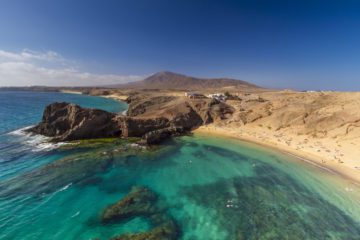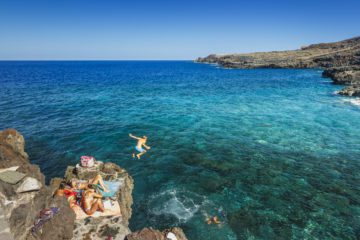Vitamin D, known for its role in preventing osteoporosis and aging, is abundant in the Canary Islands thanks to its year-round spring-like climate.
When we talk about the health benefits of Island living, the eight islands of the Canary archipelago stand out as Vitamin D havens. With 1,500 kilometers of coastline, offering a diverse range of beaches to suit all preferences, 1,200 kilometers of hiking trails, and over 4,000 hours of sunlight annually, these islands boast an ideal environment. The region experiences minimal rainfall and maintains an average temperature of 21°C throughout the year. According to Dr. María Dolores Gallego Segovia, this combination of sun and outdoor enjoyment makes the Canary Islands a place where bone health and a robust immune system are guaranteed.
Just Fifteen minutes a day
All it takes is fifteen minutes of sun exposure on your face or any other part of your body to meet your daily vitamin D needs. Dr.Gallego Segovia emphasizes, “It helps the body absorb calcium, a crucial component for strong bones. Together with calcium, vitamin D plays a vital role in preventing osteoporosis, a condition that weakens bones, making them more susceptible to fractures.”
Furthermore, vitamin D contributes to the transmission of neuromuscular signals and various metabolic functions, strengthens the immune system, improves cardiovascular health, and has potential preventive effects on conditions like obesity and certain cancers, according to María Dolores Gallego.
Sun, mountains, sea, and active sports
The Canary Islands, with their breathtaking city beaches like Las Canteras, in Las Palmas de Gran Canaria; and paradisiacal stretches like El Cofete in Fuerteventura, or Nogales in La Palma, are described as medicine for the body. Gallego Segovia advises, when it comes to sun exposure “Always with high sun protection and never in the middle of the day,” acknowledging that vitamin D can offer multiple benefits for the skin, including stimulating collagen production, improving skin hydration, reducing inflammation, preventing premature aging, and aiding in skin healing.
Recognized by UNESCO as a Biosphere Reserve, Lanzarote, La Palma, Gran Canaria, and El Hierro showcase unique and abundant nature. This recognition makes the archipelago a popular destination for active outdoor tourism. The year-round enjoyment of activities such as hiking, mountain running, or mountain biking adds to the draw of receiving vitamin D from the sunny outdoors.

Healthy food in the Canary Islands
Beyond the sun, the Canary Islands offer fresh local produce, such as seafood from their rich fishing grounds. The region’s fishing is so prolific that annual quotas are established to protect in-demand species like bluefin tuna. According to María Dolores Gallego, “Oily fish like tuna, salmon, and mackerel are among the best sources of vitamin D, along with liver. Other foods providing vitamin D in smaller quantities include cheese, egg yolks, and mushrooms.”
Sunbathing for a Mood Boost
Doctors recommend sunbathing for a mood boost, as it enhances the production of vitamin D. Gallego Segovia notes, “Sunbathing makes us feel better, and this effect is due to the abundance of vitamin D in the Canary Islands.”

